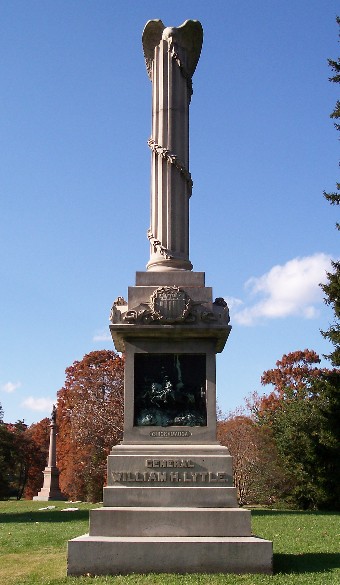5fish
Well-Known Member
- Joined
- Jul 28, 2019
- Messages
- 10,699
- Reaction score
- 4,554
I was rotting around the Nov. 2 event in history and found this man a warrior-poet of the Civil War. Who was known for his poetry before the Civil War. His most famous poem was called “Antony and Cleopatra” in 1858...
From Wiki...
William Haines Lytle (November 2, 1826 – September 20, 1863) was a politician in Ohio, a renowned poet, and military officer in the United States Army during both the Mexican–American War and American Civil War, where he was killed in action as a brigadier general.
Snips... General Lytle had a Type A personality life for he was many this and fought in a few wars and found time for poetry. He was wounded a few times and capture once during the Civil War and killed in action at Chickamauga on the hill that now bears his name "Lytle Hill".
He was severely wounded in his left calf muscle in a fight at Carnifex Ferry on September 10, 1861, and was sent home to recover.
He was again wounded and taken prisoner at the Battle of Perryville in Kentucky on October 8, 1862. He was soon exchanged and rejoined the army.
Lytle was mortally wounded at the Battle of Chickamauga in Georgia while leading a counterattack on horseback. Once his identity was known, respectful Confederates placed a guard around his body, and many recited his poetry over their evening campfires.[2] The hill where he died is now known as "Lytle Hill" in the Chickamauga National Military Park.
Snip... In death, he was honor by the confederates and honored that night with the reciting his poems back him with many verses for his famous “Antony and Cleopatra” ...
Snip... The shooter was never known except in this tale...
The alleged shooter of Lytle was never discovered, and to this day has never been discovered, all that is known is that the shooter was a Confederate sniper using a Whitworth .45 caliber percussion rifle.
However, according to history presented to The Daughters of The Confederacy, the shooter was Hillary Garrison Waldrep of Company B of the 16th Alabama Regiment of Infantry. In order to make the shot that was purportedly approved personally by General Bragg, Waldrep had to adjust the sights on his rifle for 200 yards beyond where they usually were. According to the account, once General Lytle fell to the ground, his horse was spooked and ran toward the Confederate soldiers. Bragg gave Hillary Garrison Waldrep General Lytle's horse, bed-roll and equipment. Waldrep later sold the horse for $100.
Snip... do not know if the tale is true...
From Wiki...
William Haines Lytle (November 2, 1826 – September 20, 1863) was a politician in Ohio, a renowned poet, and military officer in the United States Army during both the Mexican–American War and American Civil War, where he was killed in action as a brigadier general.
Snips... General Lytle had a Type A personality life for he was many this and fought in a few wars and found time for poetry. He was wounded a few times and capture once during the Civil War and killed in action at Chickamauga on the hill that now bears his name "Lytle Hill".
He was severely wounded in his left calf muscle in a fight at Carnifex Ferry on September 10, 1861, and was sent home to recover.
He was again wounded and taken prisoner at the Battle of Perryville in Kentucky on October 8, 1862. He was soon exchanged and rejoined the army.
Lytle was mortally wounded at the Battle of Chickamauga in Georgia while leading a counterattack on horseback. Once his identity was known, respectful Confederates placed a guard around his body, and many recited his poetry over their evening campfires.[2] The hill where he died is now known as "Lytle Hill" in the Chickamauga National Military Park.
Snip... In death, he was honor by the confederates and honored that night with the reciting his poems back him with many verses for his famous “Antony and Cleopatra” ...
Snip... The shooter was never known except in this tale...
The alleged shooter of Lytle was never discovered, and to this day has never been discovered, all that is known is that the shooter was a Confederate sniper using a Whitworth .45 caliber percussion rifle.
However, according to history presented to The Daughters of The Confederacy, the shooter was Hillary Garrison Waldrep of Company B of the 16th Alabama Regiment of Infantry. In order to make the shot that was purportedly approved personally by General Bragg, Waldrep had to adjust the sights on his rifle for 200 yards beyond where they usually were. According to the account, once General Lytle fell to the ground, his horse was spooked and ran toward the Confederate soldiers. Bragg gave Hillary Garrison Waldrep General Lytle's horse, bed-roll and equipment. Waldrep later sold the horse for $100.
Snip... do not know if the tale is true...







